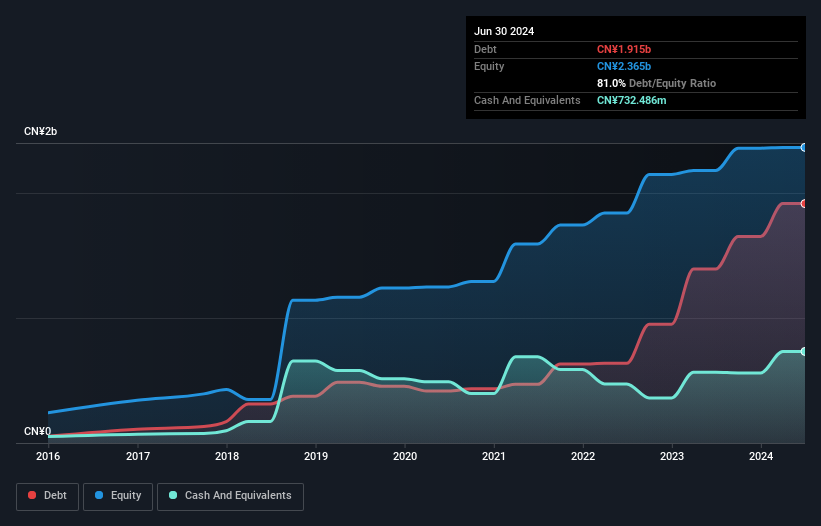Some say volatility, rather than debt, is the best way to think about risk as an investor, but Warren Buffett famously said that 'Volatility is far from synonymous with risk.' It's only natural to consider a company's balance sheet when you examine how risky it is, since debt is often involved when a business collapses. Importantly, Intron Technology Holdings Limited (HKG:1760) does carry debt. But the more important question is: how much risk is that debt creating?
When Is Debt A Problem?
Generally speaking, debt only becomes a real problem when a company can't easily pay it off, either by raising capital or with its own cash flow. In the worst case scenario, a company can go bankrupt if it cannot pay its creditors. However, a more common (but still painful) scenario is that it has to raise new equity capital at a low price, thus permanently diluting shareholders. Of course, plenty of companies use debt to fund growth, without any negative consequences. When we think about a company's use of debt, we first look at cash and debt together.
Check out our latest analysis for Intron Technology Holdings
What Is Intron Technology Holdings's Debt?
The image below, which you can click on for greater detail, shows that at June 2024 Intron Technology Holdings had debt of CN¥1.92b, up from CN¥1.39b in one year. However, it does have CN¥732.5m in cash offsetting this, leading to net debt of about CN¥1.18b.

How Strong Is Intron Technology Holdings' Balance Sheet?
We can see from the most recent balance sheet that Intron Technology Holdings had liabilities of CN¥3.09b falling due within a year, and liabilities of CN¥371.2m due beyond that. Offsetting these obligations, it had cash of CN¥732.5m as well as receivables valued at CN¥1.65b due within 12 months. So it has liabilities totalling CN¥1.08b more than its cash and near-term receivables, combined.
This is a mountain of leverage relative to its market capitalization of CN¥1.61b. This suggests shareholders would be heavily diluted if the company needed to shore up its balance sheet in a hurry.
We measure a company's debt load relative to its earnings power by looking at its net debt divided by its earnings before interest, tax, depreciation, and amortization (EBITDA) and by calculating how easily its earnings before interest and tax (EBIT) cover its interest expense (interest cover). Thus we consider debt relative to earnings both with and without depreciation and amortization expenses.
Intron Technology Holdings's debt is 3.3 times its EBITDA, and its EBIT cover its interest expense 3.1 times over. This suggests that while the debt levels are significant, we'd stop short of calling them problematic. Even worse, Intron Technology Holdings saw its EBIT tank 40% over the last 12 months. If earnings keep going like that over the long term, it has a snowball's chance in hell of paying off that debt. When analysing debt levels, the balance sheet is the obvious place to start. But ultimately the future profitability of the business will decide if Intron Technology Holdings can strengthen its balance sheet over time. So if you're focused on the future you can check out this free report showing analyst profit forecasts.
But our final consideration is also important, because a company cannot pay debt with paper profits; it needs cold hard cash. So we clearly need to look at whether that EBIT is leading to corresponding free cash flow. Over the last three years, Intron Technology Holdings saw substantial negative free cash flow, in total. While investors are no doubt expecting a reversal of that situation in due course, it clearly does mean its use of debt is more risky.
Our View
On the face of it, Intron Technology Holdings's conversion of EBIT to free cash flow left us tentative about the stock, and its EBIT growth rate was no more enticing than the one empty restaurant on the busiest night of the year. And furthermore, its net debt to EBITDA also fails to instill confidence. We're quite clear that we consider Intron Technology Holdings to be really rather risky, as a result of its balance sheet health. So we're almost as wary of this stock as a hungry kitten is about falling into its owner's fish pond: once bitten, twice shy, as they say. The balance sheet is clearly the area to focus on when you are analysing debt. However, not all investment risk resides within the balance sheet - far from it. Be aware that Intron Technology Holdings is showing 5 warning signs in our investment analysis , and 1 of those doesn't sit too well with us...
If you're interested in investing in businesses that can grow profits without the burden of debt, then check out this free list of growing businesses that have net cash on the balance sheet.
New: AI Stock Screener & Alerts
Our new AI Stock Screener scans the market every day to uncover opportunities.
• Dividend Powerhouses (3%+ Yield)
• Undervalued Small Caps with Insider Buying
• High growth Tech and AI Companies
Or build your own from over 50 metrics.
Have feedback on this article? Concerned about the content? Get in touch with us directly. Alternatively, email editorial-team (at) simplywallst.com.
This article by Simply Wall St is general in nature. We provide commentary based on historical data and analyst forecasts only using an unbiased methodology and our articles are not intended to be financial advice. It does not constitute a recommendation to buy or sell any stock, and does not take account of your objectives, or your financial situation. We aim to bring you long-term focused analysis driven by fundamental data. Note that our analysis may not factor in the latest price-sensitive company announcements or qualitative material. Simply Wall St has no position in any stocks mentioned.
About SEHK:1760
Intron Technology Holdings
An investment holding company, operates as an automotive electronics solutions provider in Hong Kong, the Mainland China, and internationally.
Reasonable growth potential with mediocre balance sheet.
Market Insights
Community Narratives



